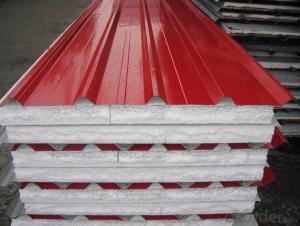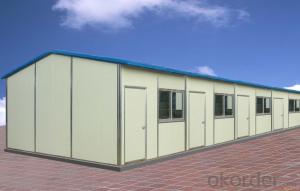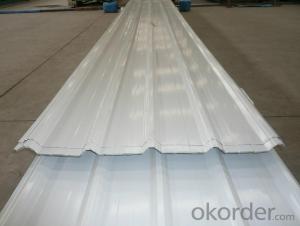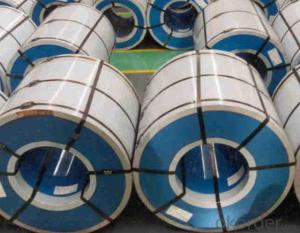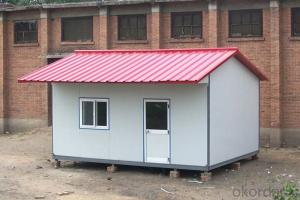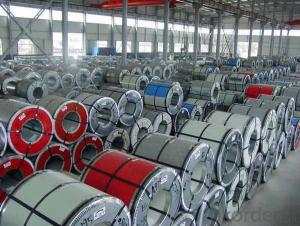prepainted steel coil from steel manufacture
- Loading Port:
- China main port
- Payment Terms:
- TT OR LC
- Min Order Qty:
- 1 m.t.
- Supply Capability:
- 1 m.t./month
OKorder Service Pledge
OKorder Financial Service
You Might Also Like
Quick Details
| Standard: | AISI,ASTM,BS,DIN,GB,JIS | Grade: | Q235,SS400,Q215,Q195,SPCC | Thickness: | 0.14MM TO 0.8MM |
| Place of Origin: | Tianjin China (Mainland) | Brand Name: | CNBM | Model Number: | COIL |
| Type: | Steel Coil | Technique: | Cold Rolled | Surface Treatment: | Coated |
| Application: | NEGOTIATED | Special Use: | High-strength Steel Plate | Width: | 10MM TO 1500MM |
| Length: | 10MM TO 1500MM |
Packaging & Delivery
| Packaging Detail: | COIL, wood or steel pallets wit plastic film, professional exporting seaworthy package, load by container or breakbulk vessel or according to customers' requirement . |
| Delivery Detail: | 1 MONTH |
Specifications
PPGI/Prepainted steel coil
Thickness: 0.14-0.80mm
Width:600-1250mm ,Znic:50-180g/M2
Colour:20-25um
Certificate:ISO9001:2000
Specifications
PPGI / prepainted steel coil
high quality and good price
PPGI / prepainted steel coil
1.Production details:
Quality | Q/BQB 440-2003 | JIS G3312-1994 | EN 10326-2004 | ASTM A653-02a |
EN 10327-2004 | (BASE PLATE) | |||
(BASE PLATE) | ||||
Commercial Steel | TDC51D | CGCC | DX51D+Z/AZ | CS Type A/B/C |
Forming Steel | (TSt01,TSt02,TSt03) | CGCD1 | FS Type A, Type B | |
Drawing | TDC52D /TDC53D | - | DX52D+Z/AZ | DDS TYPE A/C |
Steel | DX53D+Z/AZ | |||
Structural | TS280GD(TStE28) | CGC400 | S280D+Z/AZ | SS275 |
Steel | TS350GD(TStE34) | CGC440 | S350D+Z/AZ | SS340 Class1 |
Manufacturer | Thickness | Width | Length of plate | Inner diameter of coil |
CNBM | 0.2-1.2mm | 800/914/1000/1200/1219/1250mm | 1000-6000mm | 508mm/610mm |
Construction | Outside | Workshop, agricultural warehouse, residential precast unit, corrugated roof, roller shutter door, rainwater drainage pipe, retailer booth |
Inside | Door, doorcase, light steel roof structure, folding screen, elevator, stairway, vent gutter | |
Electrical appliance | Refrigerator, washer, switch cabinet, instrument cabinet, air conditioning, micro-wave oven, bread maker | |
Furniture | Central heating slice, lampshade, chifforobe, desk, bed, locker, bookshelf | |
Carrying trade | Exterior decoration of auto and train, clapboard, container, isolation lairage, isolation board | |
Others | Writing panel, garbage can, billboard, timekeeper, typewriter, instrument panel, weight sensor, photographic equipment | |
- Q:which pokemon has the most steel pokemon???
- Probaly Pokemon Platinum or Pokemon HGSS
- Q:What are the cost implications of using steel coils in manufacturing?
- The cost implications of using steel coils in manufacturing can vary depending on several factors. Firstly, the cost of purchasing steel coils themselves can have a significant impact on overall manufacturing expenses. Steel prices are influenced by factors such as supply and demand, global market conditions, and any tariffs or trade regulations in place. Fluctuations in steel prices can directly affect the cost of purchasing steel coils, which in turn affects the overall manufacturing cost. Additionally, the size and weight of steel coils can impact transportation costs. Steel coils are typically heavy and bulky, which can incur higher shipping expenses due to increased transportation requirements. The distance between the steel supplier and the manufacturing facility can also influence shipping costs. Furthermore, the processing and transformation of steel coils into finished products can contribute to manufacturing costs. Additional steps such as cutting, shaping, welding, or coating may be required depending on the desired end product. These additional processes can require specialized machinery, skilled labor, and additional materials, all of which can add to the overall manufacturing expenses. It is also essential to consider the quality and durability of steel coils. While using high-quality steel coils may initially result in higher costs, it can lead to long-term cost savings by reducing the need for repairs or replacements. Moreover, it is crucial to factor in any regulatory or compliance requirements associated with using steel coils in manufacturing. Certain industries may have specific standards or certifications that need to be met, which can involve additional costs for testing, inspections, or compliance procedures. Lastly, it is important to consider the potential cost savings that steel coils can offer in terms of efficiency and productivity. Steel coils are often preferred in manufacturing due to their strength, durability, and ease of fabrication. These qualities can lead to improved production processes, reduced waste, and higher overall output, which can offset the initial cost of using steel coils. Overall, the cost implications of using steel coils in manufacturing can be influenced by several factors such as steel prices, transportation costs, additional processing requirements, quality considerations, regulatory compliance, and potential productivity gains. Careful analysis and consideration of these factors are crucial in understanding the overall cost impact on manufacturing operations.
- Q:Can i make holes in iron and steel with somekind of drill bit. All i have is metal drill bits. Mabey like 68 of them but i dont know wich one to use and if they will penetrate.
- It really depends. If you are drilling iron, I assume you are talking about cast irons and there are many different types, some are easier to drill (and machine) than others. For steels, there are many many different types of steels which can have a huge range of physical properties. In fact, your drill bits are almost certainly made of some type of steel alloy. If your drill bit has the same hardness as the steel you are trying to drill, it will be difficult to drill. If the steel is harder than the drill bit, you won't make a hole, you'll just break your drill bit into smaller pieces. There are drill bits that use carbide inserts or diamond composite inserts and these will drill through steel. You can do a quick check. Take a drill bit and, just by hand, see if it scratches the steel. If it does, then the drill bit is harder than the steel and you can probably drill a hole. If you have trouble drilling holes, consult a machinist. There are many factors which influence how well you can drill holes including use of cutting oils/lubricants, cutting speed, pressure, rake angle, etc.
- Q:I installed it, added it in F3 launcher and then after one minute of walking in wasteland I get a signal that Broken steel was added and that my level of caps was raised by 30. However after this message no quest is added. I played all 4 exp. packs and I had no problem at all, each time a new quest was added. So whats up with this Broken steel. Btw, I completed the entire game F3.
- Broken Steel doesn't begin until the main quest ends.
- Q:How do steel coils impact the overall cost of production?
- The overall cost of production in various industries is greatly affected by steel coils. Initially, the expense of the steel coils themselves can be quite significant. The price of steel is influenced by several factors, including supply and demand, raw material costs, and market fluctuations. Any increase in the price of steel coils can directly impact the overall cost of production, as they are a major component in the manufacturing process. Furthermore, the operational costs of production are also influenced by steel coils. These coils are commonly used in different manufacturing processes, such as stamping, rolling, and forming, which require specialized machinery. The efficiency and effectiveness of these processes greatly depend on the durability, quality, and size of the steel coils. If the coils are of low quality or not suitable for the specific production requirements, it can result in increased downtime, machinery maintenance, and rework, all contributing to higher production costs. Additionally, the transportation costs associated with steel coils can impact the overall cost of production. Steel coils are typically heavy and bulky, requiring special handling and transportation arrangements. The logistics costs can be significantly influenced by factors such as the distance between the supplier and the production facility, as well as the chosen mode of transportation. Any rise in transportation expenses, such as fuel prices or shipping fees, can directly affect the overall cost of production. Lastly, the availability of steel coils can also impact production costs. During periods of high demand or limited supply, the price of steel coils may increase, resulting in higher production costs. Moreover, if there is a shortage of steel coils due to trade restrictions or disruptions in the supply chain, manufacturers may have to resort to alternative materials or sources, which could be more expensive or of lower quality. These factors can have a ripple effect on the overall cost of production. In conclusion, steel coils have a significant impact on the overall cost of production. Their cost, quality, transportation, and availability all influence the efficiency, effectiveness, and affordability of the manufacturing process. Therefore, manufacturers must carefully consider and manage these factors to optimize their production costs and maintain competitiveness in their respective industries.
- Q:How are steel coils used in the production of storage racks and shelving?
- Steel coils are used in the production of storage racks and shelving by being processed into flat sheets or strips, which are then formed, shaped, and welded to create the various components of the racks and shelves. The strength and durability of the steel coils make them ideal for supporting heavy loads and ensuring the stability and longevity of the storage racks and shelving systems.
- Q:Hi I was thinking about buying this knife, but i wasn't sure if it was good because it's stainless steel.
- This isn't really a question for this section, but I'm still happy to help out since I'm a big cutlery nerd as well. One thing to look out for when buying a knife is a lack of specifics on what steel is being used. High Carbon Stainless Steel doesn't tell you what the steel is, just what it MIGHT be. Chances are it's something along the lines of 420HC or 440A, both of which are softer steels. They aren't the worst steels around, but they are very quick to dull. You'd be better off looking at the Balisongs of Benchmade. They'll cost more, but you'll know that you're getting something made with quality materials and that won't break on you. And if it does break for some odd reason, Benchmade's warranty and customer service are both fantastic. Although if a more questionable knife is okay with you as long as the price isn't too high, then at least 420HC and 440A aren't too brittle and will take a decent edge even though they'll dull quickly. As for whether stainless steel is good for a knife or not, that depends on the type of stainless steel and what you're going to use the knife for. Many stainless steels are more brittle than a carbon steel, so high carbon stainless steels are a bit more likely to rust but a little tougher as well. In a butterfly knife, a steel like that is a good way to go, although the steels used by Benchmade, as I mentioned, are of a much better quality.
- Q:Are steel coils used in furniture manufacturing?
- Yes, steel coils are commonly used in furniture manufacturing. They are often used as a supportive framework in upholstered furniture, such as sofas and chairs, providing stability and durability to the overall structure.
- Q:What is the average thickness tolerance for steel coils?
- The average thickness tolerance for steel coils can vary depending on the specific industry and application, but a common tolerance range is typically around ± 0.005 to ± 0.010 inches.
- Q:How are steel coils priced and traded in the market?
- Steel coils are priced and traded in the market based on several factors. The primary factor is the current demand and supply dynamics of the steel industry. When the demand for steel coils is high, the prices tend to increase, and vice versa. Another important factor in pricing steel coils is the cost of raw materials, such as iron ore and coal, which are essential for steel production. Fluctuations in the prices of these materials can directly impact the pricing of steel coils. Additionally, the quality and specifications of the steel coils also play a significant role in determining their price. Higher-quality coils with specific characteristics, such as strength, corrosion resistance, or surface finish, may command a premium price in the market. The trading of steel coils is primarily done through various platforms, including physical exchanges, futures contracts, and over-the-counter (OTC) markets. Physical exchanges allow buyers and sellers to trade steel coils by exchanging physical deliveries. Futures contracts, on the other hand, enable traders to buy or sell steel coils at a predetermined price and future date, providing a way to hedge against price fluctuations. The OTC market is another avenue for trading steel coils, where buyers and sellers negotiate and agree on prices directly without going through a formal exchange. This provides flexibility and customization in trading, allowing for specific requirements to be met. Overall, the pricing and trading of steel coils in the market are influenced by demand and supply dynamics, raw material costs, quality specifications, and trading platforms. It is a complex process that requires careful consideration of various factors to determine fair prices and facilitate efficient trading.
1. Manufacturer Overview |
|
|---|---|
| Location | |
| Year Established | |
| Annual Output Value | |
| Main Markets | |
| Company Certifications | |
2. Manufacturer Certificates |
|
|---|---|
| a) Certification Name | |
| Range | |
| Reference | |
| Validity Period | |
3. Manufacturer Capability |
|
|---|---|
| a)Trade Capacity | |
| Nearest Port | |
| Export Percentage | |
| No.of Employees in Trade Department | |
| Language Spoken: | |
| b)Factory Information | |
| Factory Size: | |
| No. of Production Lines | |
| Contract Manufacturing | |
| Product Price Range | |
Send your message to us
prepainted steel coil from steel manufacture
- Loading Port:
- China main port
- Payment Terms:
- TT OR LC
- Min Order Qty:
- 1 m.t.
- Supply Capability:
- 1 m.t./month
OKorder Service Pledge
OKorder Financial Service
Similar products
New products
Hot products
Related keywords
